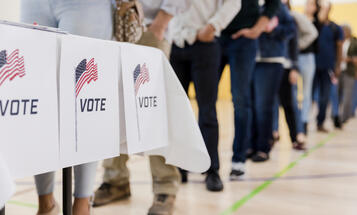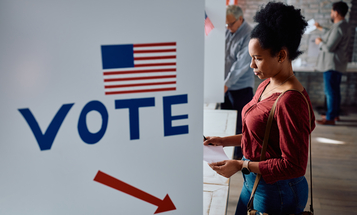
Immigration Data That Trump’s “Election Integrity” Commission May Use Is a Pretext to Suppress Latino Voting Rights
Much has been written that clearly demonstrates that Donald Trump’s one-sided “election integrity” commission is a sham that will be used to justify generalized voter suppression. Many states have rightly refused to provide private data from their voting rolls to the commission. However, the commission will still have access to highly inappropriate federal immigration data to “study” Trump’s theory that millions of noncitizens have voted, and it may advocate for voter suppression based on that limited data. For those of us who have seen these methods before, it is obvious that the federal immigration data the commission will rely on is simply a pretext to diminish the growing political power of Latinos and other communities of color.
First, consider the source. Trump’s commission is co-chaired by Kansas’ infamous secretary of state, Kris Kobach. Kobach was trained by Harvard Professor Samuel Huntington, who published a book in 2003 arguing against Latino immigration, based on the theory that the U.S. is founded on Anglo-Protestant culture, so Latinos don’t belong. Since then, Mr. Kobach has made his legal and political career aggressively attempting to limit the fundamental rights of Latinos. He was the author of Arizona’s anti-immigrant laws, and the driving force behind Kansas’ and other states’ requirements that voters produce expensive documentary proof of citizenship. He has lost case after case, but that hasn’t stopped Trump from appointing him, nor has it stopped Kobach’s patently false allegations of rampant voting by noncitizens. Study after study has shown that noncitizen voting is exceedingly rare.
Second, the federal immigration data the commission will use to study “election integrity” is inaccurate and untrustworthy. As I wrote in 2012, if this data is used for voter list maintenance, it is bound to have a discriminatory impact. This continues to be true on the eve of the Trump commission’s first hearing on July 19th.
The main source of the commission’s potential data is the Systemic Alien Verification for Entitlements (SAVE) database. Since 2010, a dozen states have attempted to use SAVE to determine whether noncitizens were on their voting rolls, with very bad results. SAVE is not a complete and accurate determination of citizenship. This is because unlike authoritarian regimes, the United States does not maintain a list of citizens, nor does it issue a singular identification document for citizens that could be kept in a database. SAVE does not include persons born in the U.S., and it also doesn’t fully include all naturalized citizens or persons with derivative citizenship who were born abroad to U.S. citizen parents. Therefore, several states stopped using the SAVE database and in 2014, the Eleventh Circuit Court of Appeals held that its use would jeopardize the voting rights of naturalized citizens, as they were likely to be misidentified as noncitizens and subject to wrongful voter challenges and purges.
Other federal immigration databases that Trump’s commission can access are also rife with errors. For example, the Trump administration has recently issued lists of “criminal immigrants” that mistakenly included babies and toddlers. And for many years, the federal government has issued requests that local police detain immigrants based on data that is so faulty that persons with legal status and even U.S. citizens have been the subject of such detainers. In May, over two-thirds of 1,400 persons arrested in “round-ups” by Trump’s immigration authorities were U.S. citizens. Moreover, the complexity of the U.S. immigration system makes it difficult to properly track citizenship. Many persons who applied for asylum or refugee status, or for temporary student or work-related visas, or for permanent legal status through family members, have since become naturalized, yet their prior status may still be in the federal databases that Kobach will access.
Furthermore, because of name-matching errors, SAVE and any other databases used by the commission are likely to identify U.S.-born citizens to be challenged and purged from the voting rolls. In Florida in 2012, a World War II veteran born in the Bronx and various U.S. citizens born in Puerto Rico were among the thousands of persons that the state alleged were wrongfully on the voting rolls. However, the greatest potential error generated from immigration databases lies in misidentification of naturalized citizens.
Perhaps the most critical fact to understand is that targeting alleged noncitizens on the voting rolls as the Trump commission is charged with doing has a racially discriminatory impact. Just before the 2012 election, Florida settled a discrimination claim regarding its purge of alleged noncitizens from the voting rolls. This was the same purge that targeted naturalized citizens, and 85% of persons on Florida’s list were people of color. The most recent Census data shows that on a national level, naturalized citizens are more racially diverse than persons born in the United States. Among naturalized citizens, over 10% are black, over 32% are Asian and Pacific Islander, and another 32% are Latino. In 2012, over 8% of voting-age citizens were naturalized citizens. Although these numbers are under-studied, we know that among Latinos, naturalization surged prior to the 2016 election. If Trump’s commission uses the data it says it will use, it will target this growing demos with false allegations of noncitizen voting. We must fight against the purging of these voters, because in America we are not supposed to have two classes of citizenship, no matter what the current president believes.



